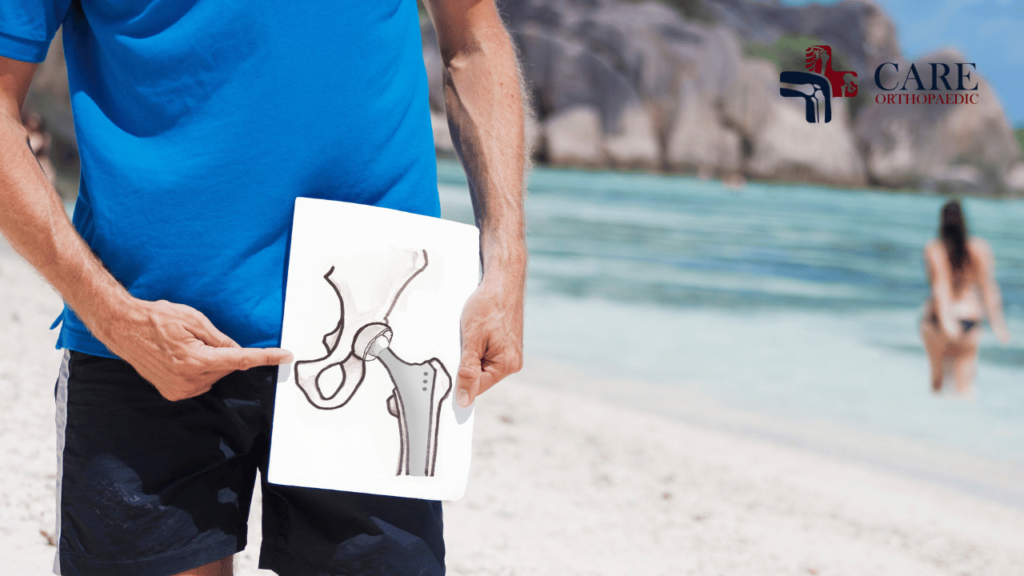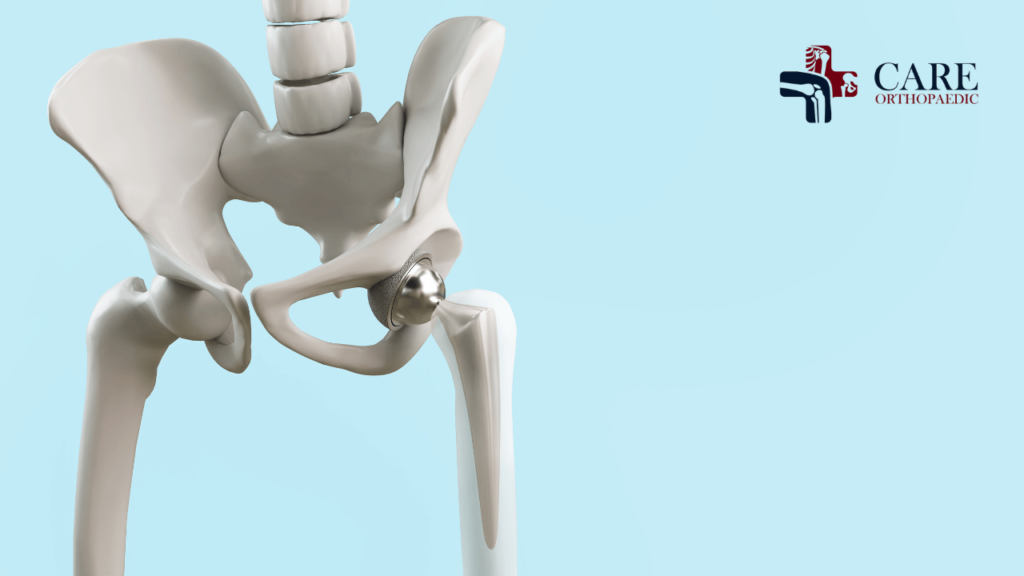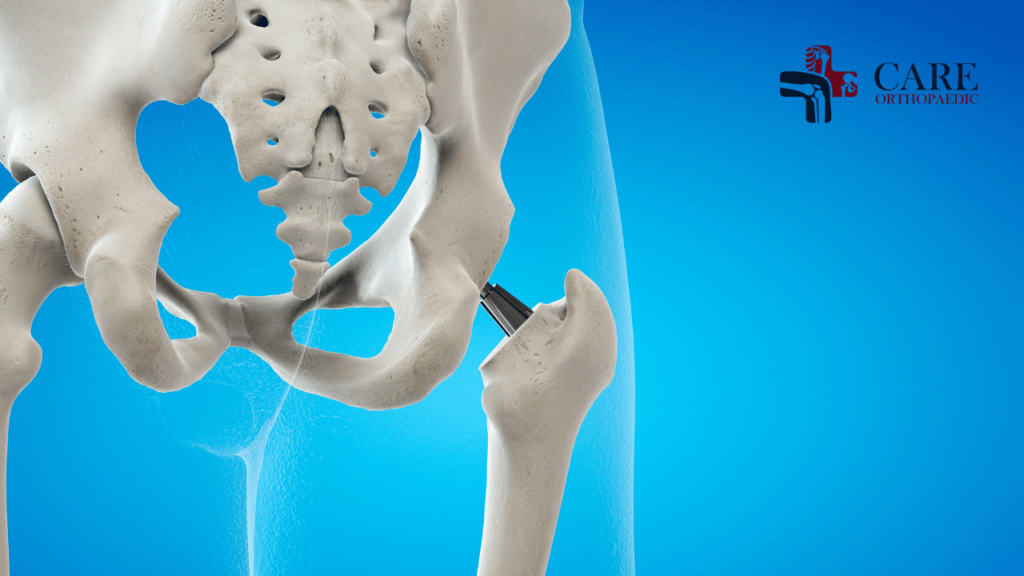Overview
What a relief it could be to not have to deal with the constant pain in your hip which started bothering you for several years each day. Envision yourselves strolling along Marine Drive while taking in the sea breeze and without giving your hip a second thought. For many people, a total hip replacement in Mumbai makes their wishes come true. Frequent hip unease may negatively impact your standard of life, regardless of the cause—arthritis, injury, or other hip disorders. The medical staff at CareOrthopaedics consists of skilled Orthopaedic surgeons who are passionate about assisting yourself with regaining your ability to move and living your life to the utmost.

How Do I Choose the Right Surgeon for Total Hip Replacement in Mumbai?
Selecting the appropriate surgeon is essential to guaranteeing that your complete hip replacement in Mumbai goes well. The following advice will help you:
- Credentials and expertise: Seek a hip replacement surgeon with a wealth of expertise and specialized training in these procedures. For instance, hip and knee Orthopaedic surgeon Dr. Supreet Bajwa had further training in Australia and India as part of his fellowship.
- Reviews and Reputation: To learn more about the reputation of the surgeon, go through patient endorsements and reviews. Positive comments and fruitful results are useful markers.
- Talking with: Make an appointment for a consultation to go over your condition, the surgeon’s strategy, and any worries you may have. Examining the surgeon’s bedside manner and communication style is another opportunity presented by this encounter.
What are the Pre-Op Preparations for a Total Hip Replacement?
Preparing for total hip replacement in Mumbai involves several important steps to ensure a smooth procedure and recovery. Here’s a checklist:
- Medical Evaluation: Undergo a thorough medical evaluation, including blood tests, imaging studies, and physical assessments.
- Medication Management: Discuss with your surgeon any medications you are currently taking. You might need to stop certain medications before surgery.
- Physical Preparation: Engage in exercises to strengthen the muscles around your hip. This can aid in post-surgery recovery.
- Home Preparation: Arrange your home to be recovery-friendly. Set up a comfortable resting place, remove tripping hazards, and ensure you have necessary assistive devices like crutches or walkers.
What Should I Expect During My Total Hip Replacement Surgery?
Setting reasonable expectations and lowering fear may be achieved by being aware of what happens during a complete hip replacement in Mumbai:
- Anesthesia: The process of surgery begins with an introduction of anaesthesia. Some of you will receive perhaps spinal anesthesia or a general anesthetic, depending on your specific circumstances and the surgeon’s recommendation.
- Surgical Procedure: A prosthetic joint made of ceramic, metal, or plastic components will be inserted in the place of the hip joint after the diseased bone and cartilage have been removed.
- Duration: The procedure typically takes one to two hours to finish.
After the procedure, you’ll be sent to a recovery area, where you’ll have your vital signs monitored while you awaken from the anesthesia.

How is the Recovery Process After a Total Hip Replacement in Mumbai?
Following a complete hip replacement in Mumbai, the following phases of recuperation are involved:
- Following surgery: You’ll be in the hospital for a few days. The primary objectives include alleviating pain, minimizing blood clots, as well as initiating physical therapy.
- Rehabilitation: Following being discharged, physical therapy is continued to enhance flexibility, power, and movement.
- Home Recuperation: Adhere to the at-home care recommendations provided by your surgeon. This covers dressing changes, prescription drugs, and activity limitations.
- Regular follow-up: Appointments with your surgeon are necessary to track your recovery and resolve any issues.
What are the Common Risks and Complications of Total Hip Replacement?
Even though total hip replacement in Mumbai is usually safe, there are still possible dangers and consequences to be mindful of:
- Infection: Possibility of infection around the prosthetic joint or at the location of the incision.
- Blood Clots: Following surgery, there is a chance that blood clots will develop in the leg veins.
- Implant problems: Over time, the prosthetic joint may deteriorate, become loose, or dislocate.
- Damage to the nerves or blood vessels: This is uncommon but can happen during the operation.
What Rehabilitation Services Are Available in Mumbai for Post-Op Recovery?
For those recovering from a complete hip replacement, Mumbai provides a range of rehabilitation services:
- Inpatient rehabilitation centers: Post having surgery, these facilities offer comprehensive medical care as well as intense physical therapy.
- Physical therapy clinics that offer outpatient services: Utilize customized training regimens to sustain your recovery.
- PT at Home: For patients who find it difficult to travel, several programs provide home visits.

How Can I Maintain My New Hip Joint After a Total Hip Replacement?
Sustaining your newly acquired hip joint is essential to your long-term mobility and well-being. This is how you can handle it:
- Keep Moving: To maintain the health of your joints, take part in low-impact exercises like cycling, walking, and swimming.
- Weight management: To prevent overstressing the hip joint, keep a healthy weight.
- Frequent Check-Ups: To keep an eye on the implant’s health, make routine follow-up appointments with your surgeon.
- Avoid Activities with a High Impact: Avoid exercises like jogging and jumping that place too much strain on your hips.
Why Choose CareOrthopaedics for Total Hip Replacement in Mumbai?
When it comes to total hip replacement in Mumbai, CareOrthopaedics stands out for several reasons:
- Expertise: Led by Dr. Supreet Bajwa, a highly qualified and fellowship-trained Orthopaedic surgeon, brings extensive experience and specialized knowledge in hip replacement surgeries.
- Advanced Techniques: We utilize the latest surgical methods and technologies to ensure precision and optimal outcomes.
- Comprehensive Care: From pre-operative evaluation to post-operative rehabilitation, we provide holistic care tailored to each patient’s needs.
- Accessibility: Our services are available in multiple hospitals across Mumbai, making it convenient for you to receive top-quality Orthopaedic care.
Conclusion
For people with persistent hip discomfort, a total hip replacement in Mumbai can be a life-changing operation. You may restore your mobility and lead a pain-free life by selecting the best surgeon, being well-prepared, and adhering to an organized rehabilitation plan. We at CareOrthopaedics are committed to giving you the best possible treatment at every stage, utilizing the most recent developments in Orthopaedic surgery. Today, take the first step in improving your quality of life.

FAQs
1. What is the duration of recovery following a complete hip replacement?
Ans. While complete healing might take up to a year, most patients are able to resume their regular activities in three to six months.
2. When I have hip replacement surgery, may I travel by air?
Ans. Flying is often safe four to six weeks after surgery, but it’s crucial to speak with your physician for specific guidance.
3. Will I eventually require a second hip replacement?
Ans. Even though contemporary hip implants can last up to 15–20 years, some patients may need revision surgery if problems develop or the implant wears out.
4. How soon after a complete hip replacement can I drive?
Ans. As long as they can drive the car comfortably and safely, most patients may get back behind the wheel 4-6 weeks after surgery.
5. After having a total hip replacement, are there any activities I should avoid?
Ans. It is best to avoid high-impact exercises like sprinting, leaping, and heavy lifting in order to preserve your newly acquired hip joint. To keep active and healthy, concentrate on low-impact workouts.


